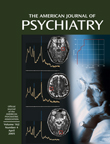Phenylthiocarbamide Perception in Patients With Schizophrenia and First-Degree Family Members
Abstract
OBJECTIVE: The inability to taste phenylthiocarbamide (PTC) has been associated with medical and neurological illnesses not typically related to taste. The authors examined PTC sensitivity in schizophrenia patients and their non-ill relatives to determine whether this represented a vulnerability marker. METHOD: PTC sensitivity was assessed in 42 schizophrenia patients, 23 healthy comparison subjects, and 12 first-degree relatives of the patients. RESULTS: More nontasters were found among patients and family members than healthy comparison subjects. Among patients, nontasters had more positive symptoms. Differences were not explained by sex, age, medication, smoking, or cognitive impairment. CONCLUSIONS: The prevalence of PTC nontasters was greater among schizophrenia patients and non-ill first-degree family members. Phenotypic variation in PTC sensitivity is genetic in origin. This suggests a higher risk for illness among subjects with recessive alleles.



